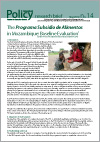
The Programa Subsidio de Alimentos in Mozambique: Baseline Evaluation
Abstract:The Food Subsidy Programme (Programa Subsidio de Alimentos, PSA) is the main basic social protection programme of the government of Mozambique in terms of coverage. It was established in 1990 to help the destitute elderly (women above 55 and men above 60), people living with a disability, the chronically sick and their dependants by providing a monthly cash transfer. The programme falls under the mandate of the Ministry for Women and Social Action (MMAS), while implementation is the responsibility of the National Institute for Social Action (INAS), the Ministry’s executing agency. By the end of 2008, the PSA covered 143,455 households with a total of 287,454 beneficiaries. The main direct beneficiaries were the elderly (93 per cent), followed by people living with disabilities (6 per cent) and the chronically ill (1 per cent). The general eligibility criteria are: age, residency for more than six months in the selected area, per capita earnings less than the minimum benefit on the PSA scale, and/or recognised by medical declaration to be chronically ill or living with a disability. Potential beneficiaries are selected by a local intermediary (known as a Permanente) chosen by the community and appointed by INAS, after which the application undergoes an approval process within the INAS delegation. Although the PSA is a national programme, it does not reach the entire eligible population and its coverage is unequally distributed across districts. This is the result of the absence of an expansion strategy based on poverty incidence and population density. Expansion of the PSA was initially restricted to urban areas in order to mitigate the effects of the post-war structural adjustment programme on the urban population (Low et al., 1999). Currently, expansion to remote rural areas is a programme priority. The programme’s administrative cost is considered high relative to the amount transferred to the beneficiaries (Ellis, 2007). Though the programme is the largest in terms of the number of beneficiaries, its coverage is low relative to the potential universe of beneficiaries. Expansion of the programme tends to diminish the administrative costs in relative terms. In 2008, the PSA underwent two important reforms. First, the subsidy scale increased. The subsidy amount for the first (direct) beneficiaries rose from 70 to 100 meticais (US$2.5 to US$3.6), and the additional benefit for dependants increased from 10 to 50 meticais (US$0.36 to US$1.80) per dependant up to four. The second reform was the greater focus on the inclusion of eligible dependants as indirect beneficiaries in the payment scheme, and the monitoring and evaluation system. Though it is a relatively old programme, it has never been evaluated before. An opportunity to conduct an evaluation has arisen in the context of the reforms. This Policy Research Brief seeks to improve knowledge of the PSA by presenting the first part of the PSA impact evaluation—that is, the summary of the baseline report.
You can also download in other languages:
